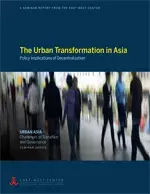Error message

Urban growth, migration, and the transformation of human settlements represent rapid and fundamental changes in the structure of Asian society and are key issues of common concern for the United States and the countries of Asia. In 1960, Asia had just one megacity, defined as an urban center with a population of 10 million or more. Today, there are at least a dozen sprawling megacities in Asia. By 2015, 12 of the 22 megacities projected to develop worldwide will be in Asia, and, by 2030, Asia will account for more than half of the world's urban population--2.66 billion people out of a total global urban population of 4.94 billion. This shift in human living patterns produces new challenges in virtually every aspect of Asia's human organization. These challenges were the focus of discussions among a small group of mayors and other high-level government leaders, urban planning practitioners, civil society representatives, and urbanization scholars from the United States, Asia, and elsewhere. The discussions took place during the East-West Center's new seminar series, URBAN ASIA--Challenges of Transition and Governance. The purpose of the series is to facilitate open discussion on policy options that can improve the quality of life for the people who live and work in Asia's urban areas. Through this seminar series the East-West Center hopes to make a contribution to the many ongoing efforts to address these changes and to strengthen the region's stability and viability. The seminar, The Urban Transformation in Asia: Policy Implications of Decentralization, was held at the East-West Center in Honolulu, Hawai'i, 11-13 August 2008. Over a three-day period, this diverse, high-level group engaged in informal, nonofficial, frank, and non-attribution discussions of current trends, implications, and long-term strategic visions for managing Asia's unprecedented urban growth. Four key elements of importance in Asia's urban transformation were discussed: democracy and decentralization, urban infrastructure, the role of civil society, and urban climate change. At the conclusion of the seminar, the participants identified several key issues, lessons learned, and ideas that resonated with them during the discussions, and that they felt merited further examination in future seminars. |
Urban growth, migration, and the transformation of human settlements represent rapid and fundamental changes in the structure of Asian society and are key issues of common concern for the United States and the countries of Asia. In 1960, Asia had just one megacity, defined as an urban center with a population of 10 million or more. Today, there are at least a dozen sprawling megacities in Asia. By 2015, 12 of the 22 megacities projected to develop worldwide will be in Asia, and, by 2030, Asia will account for more than half of the world's urban population--2.66 billion people out of a total global urban population of 4.94 billion. This shift in human living patterns produces new challenges in virtually every aspect of Asia's human organization. These challenges were the focus of discussions among a small group of mayors and other high-level government leaders, urban planning practitioners, civil society representatives, and urbanization scholars from the United States, Asia, and elsewhere. The discussions took place during the East-West Center's new seminar series, URBAN ASIA--Challenges of Transition and Governance. The purpose of the series is to facilitate open discussion on policy options that can improve the quality of life for the people who live and work in Asia's urban areas. Through this seminar series the East-West Center hopes to make a contribution to the many ongoing efforts to address these changes and to strengthen the region's stability and viability. The seminar, The Urban Transformation in Asia: Policy Implications of Decentralization, was held at the East-West Center in Honolulu, Hawai'i, 11-13 August 2008. Over a three-day period, this diverse, high-level group engaged in informal, nonofficial, frank, and non-attribution discussions of current trends, implications, and long-term strategic visions for managing Asia's unprecedented urban growth. Four key elements of importance in Asia's urban transformation were discussed: democracy and decentralization, urban infrastructure, the role of civil society, and urban climate change. At the conclusion of the seminar, the participants identified several key issues, lessons learned, and ideas that resonated with them during the discussions, and that they felt merited further examination in future seminars. |




